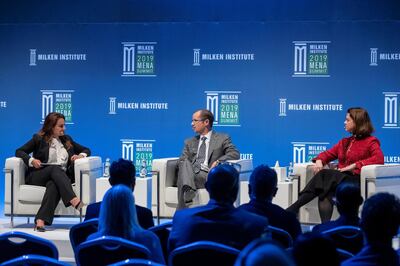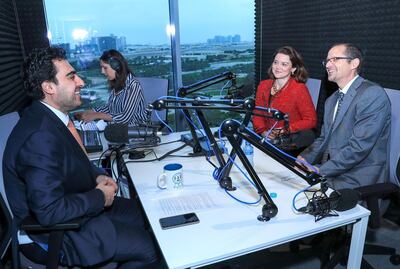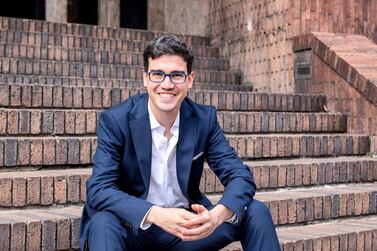More than 60,000 Abu Dhabi Government employees will be provided with access to 3,000 online courses from the world's top universities to give people the skills needed in a workplace being changed by emerging technologies.
The Abu Dhabi School of Government has partnered with Coursera, one of the world’s leading online learning platforms, to provide professional training and development programmes for critical skills in areas such as data science, artificial intelligence, leadership and digital transformation.
The world's most well known educational institutions such as Johns Hopkins, Duke and Stanford University are among the providers on the Coursera platform. Thirty courses will be fully in Arabic while 70 will have Arabic subtitles.
Solveig Nicklos, the dean of the Abu Dhabi School of Government and Jeff Maggioncalda, Coursera's chief executive spoke to The National about their partnership ahead of the Milken Institute's Mena Summit in Abu Dhabi on Tuesday, where they were taking part in a discussion titled 'Building Tomorrow's Global Workforce'.

The World Economic Forum says that the digital transformation of economies and businesses will displace 75 million jobs as the division of labour shifts between humans, machines and algorithms. However, 133 million new roles may emerge that are more adapted to this technology-led future.
Mohammed Al Gergawi, Minister of Cabinet Affairs and The Future, told the World Government Summit in Dubai this week that governments must take more of a lead role in shaping key developments that are currently being driven forward by the private sector, and that the public sector is lagging behind.
Governments will also need to consider new legislation for technologies such as 3D-printing and driverless cars. Employees will need the ability to be across all of these innovations on an equal footing with their private sector counterparts.
Ms Nicklos said that a confident and capable workforce is crucial to these efforts to build a sustainable and open economy.
The school will help train and equip government employees with the relevant skills needed for this new scenario. The partnership with Coursera will provide “unprecedented access” to a vast library of courses geared to the professional development of Abu Dhabi government employees, she said.
“The best thing we can provide is a curious, knowledge seeking government that understands how to find the information that it needs and how to interpret the data that’s available to them," said Ms Nicklos.
The Abu Dhabi School of Government was launched last year to develop the capabilities of employees across all government agencies and accelerate their career progression. It aims to engage with about half of all the emirate's public sector workers this year through both classroom and online programmes.
The school is a supporting pillar of the Ghadan 21 programme unveiled last summer by Sheikh Mohamed bin Zayed, Crown Prince of Abu Dhabi and Deputy Supreme Commander of the UAE Armed Forces.
Ghadan 21, which means Tomorrow 21 in Arabic, aims to enhance the overall competitiveness of Abu Dhabi. The school supports education efforts within the government, incorporating the latest trends and research, to ensure employees are able to meet the emirate's future needs.

The Coursera platform’s content is predominantly video based and includes assignments, quizzes and digital interaction as part of the courses. Abu Dhabi Government HR departments will have access to Coursera analytics to track the progress of its employees as they build up their skillsets.
Mr Maggioncalda said the partnership with ADSG “is the most significant initiative that we have in the Middle East right now”.
“We are fully committed to supporting Abu Dhabi’s ambition of upskilling its governmental workforce and fulfilling its potential as a knowledge economy.”
Launched in 2012 by two professors from Stanford, Coursera trains millions of government and private sector employees across a number of countries around the world including the US, India, France and Egypt.
The Middle East is a region marked by innovation amidst a major technology transformation, according to Mr Maggioncalda.
“We have over 170,000 consumer learners on Coursera right now in the UAE and the number one course is ‘learning how to learn’," he said.
"One of the most important things is becoming a life-long learner, someone who is curious and understands that the world is changing so quickly that people will need to continue to learn and upskill for the rest of their lives."





